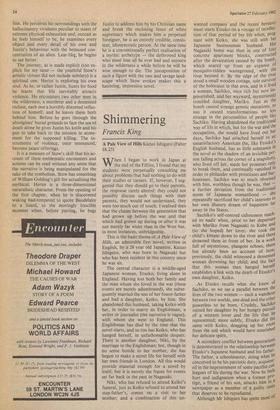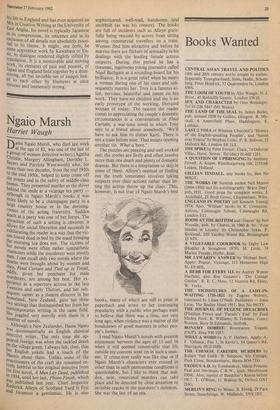Shimmering
Francis King
when I began to work in Japan at the end of the Fifties, I found that my students were perpetually consulting me about problems that had nothing to do with their studies or careers. If, however, I sug- gested that they should go to their parents, the response rarely altered: they could not possibly discuss such things with their parents, they would not understand, they were too much out of touch. I realised then that the chasm between the generation that had grown up before the war and that which had grown up during or after it was not merely far wider than in the West but, in most instances, unbridgeable.
This is the basic theme of A Pale View of Hills, an admirable first novel, written in English, by a 28 year old Japanese, Kazuo Ishiguro, who was born in Nagasaki but who has been resident in this country since he was six.
The central character is a middle-aged Japanese woman, Etsuko, living alone in England. Having lost both her family and the man whom she loved in the war (these events are merely adumbrated), she subse- quently married the son of her foster-father and had a daughter, Keiko, by him. She abandoned this husband, taking Keiko with her, in order to marry an Englishman, a writer or journalist (the narrative is vague), with whom she went to England. This Englishman has died by the time that the novel starts, and so too has Keiko, who has hanged herself, in unfathomable despair. There is another daughter, Niki, by the marriage to the Englishman; but, though in no sense hostile to her mother, she has begun to make a secret life for herself with her own friends in London. All this would provide material enough for a novel by itself; but it is merely the frame for events set far back in the past in Nagasaki.
Niki, who has refused to attend Keiko's funeral, just as Keiko refused to attend her step-father's, comes on a visit to her mother; and a combination of this un-
wanted company and the recent bereave- ment starts Etsuko on a voyage of recollec- tion of that period of her life when, preg- nant with Keiko, she was still with her Japanese businessman husband. Her Nagasaki home was then in one of four concrete apartment blocks, constructed after the devastation caused by the bomb, which soared up from an expanse of mosquito-ridden wasteground, with the river beyond it. By the edge of the river stood a small wooden cottage, sole survivor of the holocaust in that area, and in it lived a woman, Sachiko, once rich but now im- poverished, and her wayward, mysteriously troubled daughter, Mariko. Just as the bomb caused strange genetic mutations, so too it caused transformations no less strange in the personalities of people like Sachiko. Having abandoned the traditional way of life in which, but for the war and the occupation, she would have lived out her days, Sachiko had attached herself to an unsatisfactory American (he, like Etsuko's English husband, has as little substance to the novel as the shadow of an invisible per- son falling across the corner of a snapshot), who lived off her, made her promises only to break them, and continually vanished in order to philander with prostitutes and bar- hostesses. Sachiko was so much obsessed with him, worthless though he was, that — a further deviation from the traditional norm of Japanese womanhood — she repeatedly sacrificed her child's interests to her own illusory dream of happiness far away in the States. Sachiko's self-centred callousness reach- ed its nadir when, prior to her departure with Mariko from Nagasaki to Kobe and (so she hoped) her lover, she took the child's kittens down to the river and there drowned them in front of her. In a work full of mysterious, plangent echoes, there has already been an account of how, previously, the child witnessed a demented woman drowning her child; and the fact that this woman then hanged herself establishes a link with the death of Etsuko's own daughter, Keiko.
As Etsuko recalls what she knew of Sachiko, so we see a parallel between the lives of the two women — each a wanderer between two worlds, one dead and the other powerless to be born. Crudely, Sachiko ruined her daughter by her hungry pursuit of a western lover and the life that he represented; more subtly, Etsuko did the same with Keiko, dragging up her roots from the soil which would have nourished her delicate spirit.
A secondary conflict between generations is demonstrated in the relationship between Etsuko's Japanese husband and his father. The father, a schoolmaster, doing what he conceived to be his patriotic duty, acquiesc- ed in the imprisonment of some pacifist col- leagues of his during the war. Now he feels hurt and indignation when a former pro- tege, a friend of his son, attacks him in a newspaper as a member of a guilty caste that deserves to be repudiated.
Although Mr Ishiguro has spelt most of
his life in England and has even acquired an MA in Creative Writing at the University of E. ast Anglia, his novel is typically Japanese In its compression, its reticence and in its exclusion of all details not absolutely essen- tial to its theme. It might, one feels, be some apprentice work by Kawabata or En- do, its dialogue rendered slightly stilted by translation. It is a memorable and moving work, its elements of past and present, of Japan and England held together by a shim- mering, all but invisible net of images link- ed to each other by filaments at once tenuous and immensely strong.





































 Previous page
Previous page